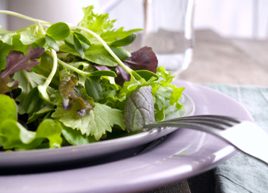6 health benefits of salad greens
Spring’s rebirth of greens means you can put in-season salads back on the menu and reap their many health benefits

Source: Best Health Magazine, May 2011
Build your bones
Spinach, radicchio and watercress may not immediately come to mind as foods for keeping bones strong, but all contain lots of vitamin K. A study at Tufts University in Boston found that low dietary intake of vitamin K in women was associated with low bone mineral density. (The study didn’t find a link in men.) Just one cup (250 mL) of chopped watercress has 100 percent of your daily vitamin K; radicchio, 120 percent; and spinach, 170 percent.
Sharpen your eyesight
Toss together a salad of spinach, romaine and red leaf lettuce: They all contain loads of the carotenoids vitamin A, lutein and zeaxanthin’key to seeing better. Vitamin A helps eyes adapt from bright light to darkness. Lutein and zeaxanthin can help filter out high-energy light that may cause eye damage from free radicals.
Rev up your muscles
Recent Swedish research found that inorganic nitrate’abundant in spinach‘resulted in muscles using less oxygen. The study, which had healthy participants ride an exercise bike before and after taking a dose of nitrate, found it improved the performance of the mitochondria’which power our cells’in muscles.
Fight breast cancer
A small study done at the University of Southampton, U.K., showed that phen-ethyl isothiocyanate in watercress disrupts the signals from tumours that cause normal tissues to grow new blood vessels to feed cancer cells. Participants, who had all been treated for breast cancer, ate a cereal-bowl-size portion of watercress. The study showed a key protein in the signalling process was affected. Although more research is needed, the study states: ‘Dietary intake of watercress may be sufficient to modulate this potential anti-cancer pathway.’
Protect your heart
Whip up a Caesar salad to benefit from romaine’s high levels of two heart-healthy nutrients: Two cups (500 mL) of shredded romaine contain 40 percent of your daily needs of folate and 10 percent of fibre. A study done at Tulane University in New Orleans showed that the higher the level of folate in a person’s diet, the lower the risk of stroke and cardiovascular disease. Soluble fibre has been shown to reduce the level of LDL (low-density lipoprotein) or ‘bad’ cholesterol.
Reduce risk of diabetes
Chronic magnesium deficiency has been linked to an increased risk of type 2 diabetes and the development of insulin resistance. Two cups (500 mL) of spinach contain 16 percent of your daily magnesium needs; arugula has six percent.
This article was originally titled “Fresh & pretty” in the May 2011 issue of Best Health. Subscribe today to get the full Best Health experience’and never miss an issue!’and make sure to check out what’s new in the latest issue of Best Health




